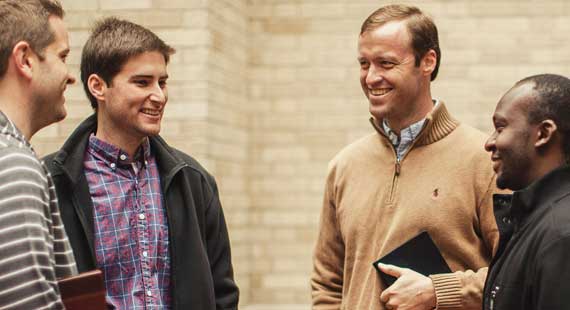Be alert and of sober mind. Your enemy the devil prowls around like a roaring lion looking for someone to devour. 1 Peter 5:8
Last spring, news of trouble at Willow Creek Community Church rippled through the evangelical world. Bill Hybels, founder of the church and the Willow Creek Association, which serves over 10,000 churches around the world, was accused of inappropriate behavior toward numerous women on his staff and in his congregation. Although Hybels denied the accusations, it wasn’t long before he resigned from a ministry he had led for over 40 years.
In the weeks following the announcement, I shared a meal with a friend who had been close to the situation for a long time. This is a person I greatly respect and learn from on a regular basis. I asked him, “Without throwing anyone under the bus, can you give me your insights into this situation and many more like it that happen in other churches?” Without blinking an eye, he responded, “Scott, in these situations, there is either truth, humility and repentance or there is deceit, pride and sin. And until the first three are a reality in all parties, there can’t be full healing.”
Last week so much evidence of deceit, pride and sin surrounding this scenario came out that the entire Board of Willow Creek Community Church has announced their resignations, along with the lead pastor and teaching pastor.
In a special congregational meeting, one of the elders proclaimed, “To all the women who have come forward, we are sorry that we added to your pain. We have no reason to not believe any of you. We are sorry that our initial statements were so insensitive, defensive and reflexively protective of Bill…We exhort Bill to acknowledge his sin and publicly apologize.” On Wednesday night, the church’s lead pastor, the Rev. Heather Larson, said she was stepping down because “trust has been broken by leadership and it doesn’t return quickly.”
The Willow Creek Global Leadership Summit, which was held last week and draws hundreds of thousands of leaders around the world for training, began with an apology. “There is no map for the journey that we’ve been on. We’ve had missteps, mistakes, slip-ups, blunders,” said Tom DeVries, president of the Willow Creek Association, which organizes the leadership summit, in his opening address. “We are sorry for the places where we could and should have done better.”
I grieve over this tragedy on so many levels. I grieve for the individuals who are victims in this situation. I grieve for the congregants and congregations of Willow Creek, which now have to carry the unnecessary pain of their leaders’ failures into their witness in the communities where they live. I grieve over the impact to the already-tarnished reputation of evangelicals in our country. Most of all, I grieve that we have once again brought dishonor to the name of God because of our unwillingness to believe him and surrender our lives fully to him.
For the last few days, my mind has been racing with thoughts about this situation:
Ministry is built on trust.
We are as sick as our secrets.
Sin gets stronger the longer it is kept in the dark.
Accountability only works if you are honest.
Full disclosure at the start is rare.
Proactive confession is always better than reactive crisis management.
Effective leadership structures matter.
Familiarity fades objectivity.
Sin splashes.
Integrity is still essential in ministry.
God is still in control.
What do we do with this?
For years, I have taught my staff and leaders to live on the solution side of every issue. We have also worked diligently to be proactive rather than reactive to minimize the number of issues that we had. With that said, I beg every individual reading this post, but especially those of you who are leaders of Converge congregations, mission fields, districts and national entities, to be proactive in your approach to three things.
Evaluate your life.
Evaluation always begins with me. It is essential that our leadership is the overflow of a personal vibrant relationship with God. We must learn how to “abide in Christ” (Jn 15:5) and we must not confuse ministry effectiveness and personal spiritual vibrancy. You can fool people for a season, but you can’t fool God (Hb. 4:13). Eventually a lack of spiritual vitality will catch up with us (Ga. 6:7,8). We must prioritize our daily communion with our heavenly Father in praise, thanks confession and intercession (1 Th. 5:16-18). We must ask God to search us and lead us (Ps. 139:23,24).
But that is not enough. The Bible says that we confess to God for cleansing (1 Jn. 1:9) but we confess to each other for healing (Jm. 5:16). I don’t know about you, but I want both! Every leader needs someone who knows them well and loves them anyway; someone with whom they feel safe enough to proactively confess the sin that they are thinking about doing and bring it out into the light to render it powerless (Jn. 3:19-21). We also need people who will walk the road with us after we sin and restore us to God and others (Ga. 6:1). This kind of relationship takes effort to find and time to develop, but it has proved invaluable in the lives of the many who have it, including mine.
Evaluate your leadership structures.
Church boards play a significant role in the life and health of a local church. The relationship between the pastor and the board is a beautiful mix of wisdom, support and encouragement in good times as well as accountability and stability in crisis. Yet I have seen too much of two things: board members that don’t have clearly defined roles and pastors that fail out, walk out and burn out. Healthy churches are led by healthy leaders. Healthy churches also have healthy systems of communication, evaluation, accountability and intervention. Now would be a great time for your church leadership to take time to renew its personal commitment to walk with Christ, to keep each other accountable for personal walks and to develop proactive plans to handle unforeseen crisis…before it happens.
Evaluate your links of support (outside your four walls).
One of the biggest realizations in this scenario was the Willow Creek leadership’s confession that they could not be objective in the midst of this crisis. As Andy Stanley says, “time in erodes awareness of” – the Willow Creek leadership team couldn’t see clearly to deal with the crisis.
This is a glaring weakness of choosing to be an independent church instead of being a part of a network of churches like Converge. While our churches are autonomous in governance, we choose to be interdependent in ministry and life. We like each other. We learn from each other. And we lean into each other in times of trouble.
We are Better Together on so many levels.
First, we are grateful that God has provided great district leaders who offer assistance and expertise to our churches in times of crisis. These leaders and their teams are prepared to help our churches. No Converge church should ever feel alone or ill-equipped in these difficult moments.
Second, while Converge is missionally-driven – we are intent on seeing the Great Commission fulfilled in our areas of influence – we are also relationally-devoted. We want to take the hill, but we want to take it together. We see ourselves as partners in the gospel and understand the essential need of friendship in ministry. At our district and national events and in LEAD team meetings, we intentionally spend more time in circles than in rows. We offer coaching and covering relationships so that those who have “been there, done that” can walk alongside of those who are new to the journey. We strive to engage pastors and leaders relationally with other like-minded, like-hearted leaders so that they can develop bonds of friendship that will help them weather the storms of ministry together. (As an additional note, we have restructured our international ministry to provide more care, coaching and accountability for our missionaries on the field. IM team – we love you and are for you!)
Third, our national and district leadership have worked hard to develop trainings that proactively equip our churches to avoid the landmines of ministry we have seen in this situation. Recently we have seen the crucial role that Boards play in the lives of our churches, so we are developing new tools for training churches in this area. Our Church Planting 201 helps church plants develop effective board practices from the beginning. In recent months, the district leaders have worked with our Church Strengthening office to develop Compass, a multi-day experience that helps established church pastors and spouses evaluate their present personal and ministry health in order to be fully prepared for the next season. At present, Compass is being tested with three of our districts with hopes of expanding to all districts. And while some districts already provide church board training, the national office is working to develop an “Effective Church Board” seminar to be unveiled in 2019.
As a fellow leader with many of you, I ask that you join me in evaluating your life, leadership and links. Ask God to search your heart, strengthen your team and solidify your network. Ask him to provide someone with whom you can be transparent. Ask God to help you and your church embrace “truth, humility and repentance” wherever it is missing. And ask God about your next step in inviting other Converge leaders and congregations to walk this road with you.
One more thing. Some of you have friends who lead congregations outside of Converge. And while they may be doing well now, eventually every church runs into a crisis. Why not take this opportunity to talk to them about joining the Converge family? If you have the conversation, communicate that to your district office. All of them have been equipped with materials to share about the advantages of being a part of our movement.
While I grieve over the events of the past few months, I also find myself grateful. I am grateful for the tremendous impact that Willow Creek has had on my life and ministry and those of many others. I am grateful that God uses situations like this to refine his church, if we are attentive and willing. I am grateful that God still uses broken people (like me). And I am most grateful that God is still in control and He will accomplish his purpose in this world.
May God give you the wisdom to know the right things to do and the courage to do them.



